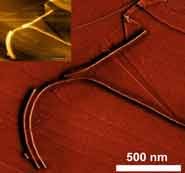May 31 2010
Cylindrical structures such as fibres or filaments with nanoscale dimensions are rapidly attracting interest for use in a variety of potentially important applications - the controlled delivery of drugs to the body, for instance.
 Cylindrical nanostructures on a carbon surface.
Cylindrical nanostructures on a carbon surface.
However, the ability to prepare samples where the dimensions are precisely controlled is very rare outside the biological domain. This represents a major drawback as there is a need to create cylindrical structures that vary in length.
A collaboration between researchers in two departments at the University of Bristol, England, and another group at the University of Toronto, Canada, has now led to the discovery of a new self-assembly method for controlling the dimensions of cylinders created from polymer precursors which contain two chemically different segments joined together, so the length of the cylinders can be precisely controlled.
The results are published online today in the prestigious journal Nature Chemistry.
Professor Ian Manners, a senior author on the paper, said: “The method relies on crystallisation as the driving force for the controlled assembly process. The work lays the conceptual groundwork for a broad variety of exciting developments - from the potential discovery of new phenomena to the creation of new nanoscopic devices, multifunctional catalysts, and controlled drug delivery vehicles.”
The collaborative work was performed by postdoctoral research associates Dr. Joe Gilroy and Dr. Torben Gaedt, together with Dr. George Whittell and Dr Laurent Chabanne in the Ian Manners Group, and atomic force microscopy expert Dr John Mitchells, all in the School of Chemistry at Bristol, along with Professor Robert Richardson in the Department of Physics at Bristol, and collaborator Professor Mitchell Winnik in the Department of Chemistry at the University of Toronto.